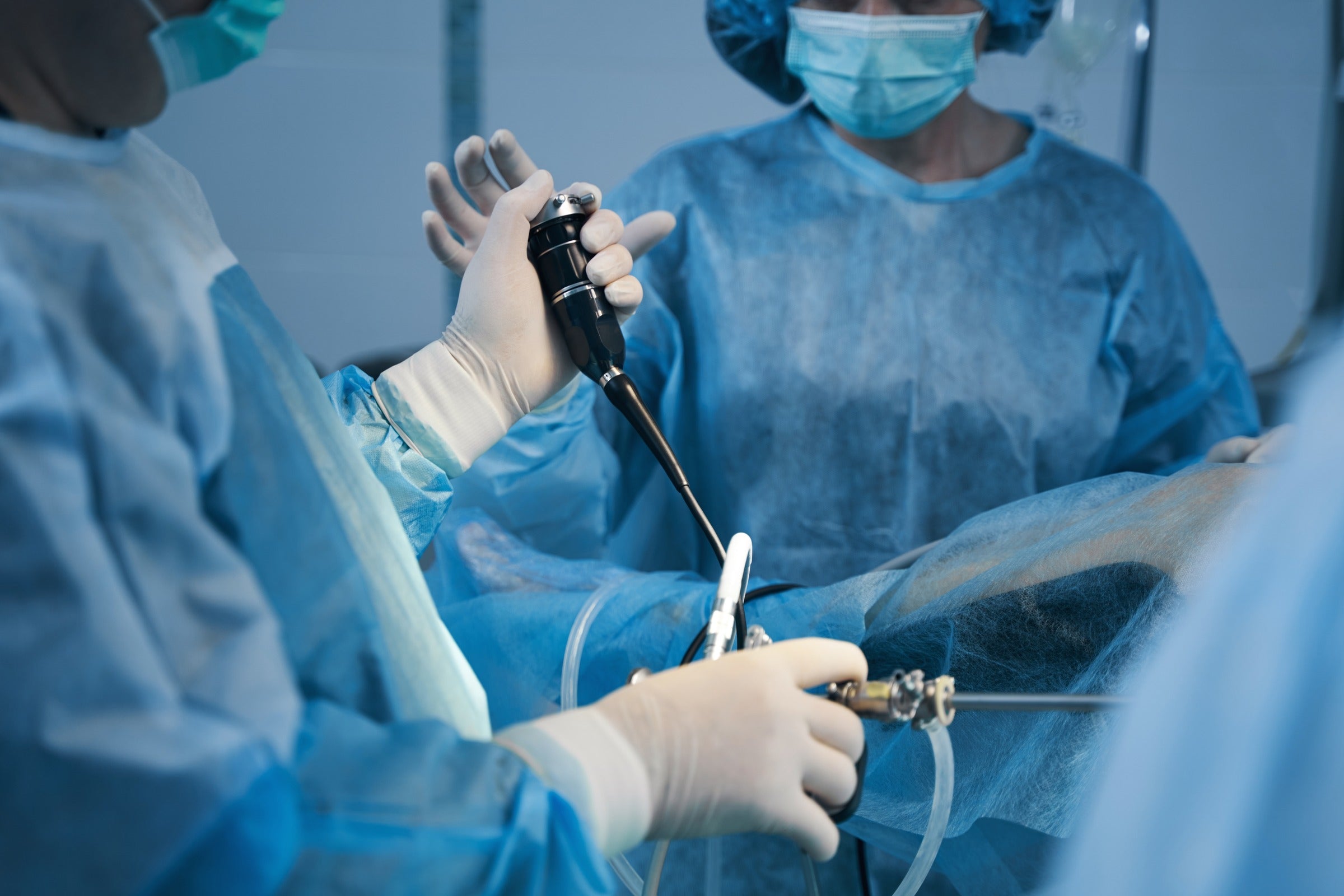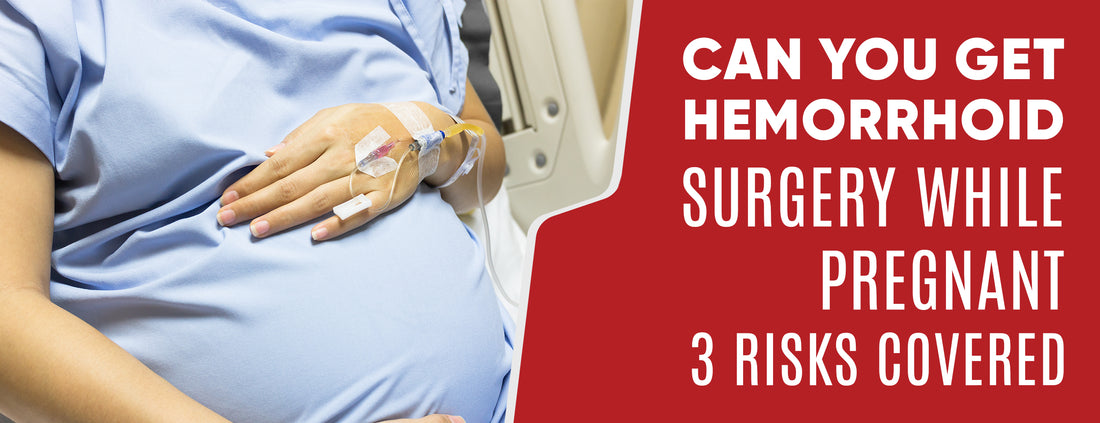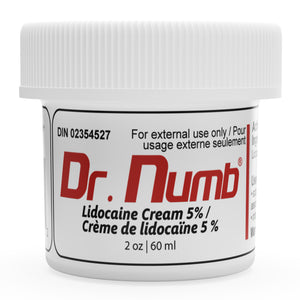You may wonder if surgery is safe if you're experiencing hemorrhoids during pregnancy. Is it possible to have hemorrhoid surgery while pregnant?
Hemorrhoid surgery during pregnancy is typically avoided, except in rare cases when it is considered essential. Any surgery during pregnancy has risks that must be weighed against potential benefits.
In some cases, surgery may be necessary to provide relief. However, any medical procedure carries risks, especially when performed while pregnant.
This blog post will explore the types of hemorrhoid surgery, the potential risks and benefits, and what factors you should consider before deciding on surgery.
Can You Get Hemorrhoid Surgery While Pregnant: 3 Risks

Hemorrhoids are common in pregnancy, and it's not a dangerous one. Surgery is an option for treatment, but it carries serious risks for expectant mothers. Let's explore safer treatment options for both mothers and babies to deal with hemorrhoids during pregnancy.
Surgery is always associated with some degree of risk, especially when performed during pregnancy. Some of the risks involved in undergoing surgery while pregnant include:
- Excessive bleeding: Surgery may cause bleeding from the surgical site or internally. Bleeding may require blood transfusion or additional surgery and may affect the blood supply to the fetus.
- Infection: Surgery may introduce bacteria into the surgical site or the bloodstream. Infection may require antibiotics or additional surgery and cause fever, sepsis, or miscarriage.
- Anesthesia: Anesthesia may have adverse effects on the mother or the fetus. Anesthesia may cause nausea, vomiting, low blood pressure, allergic reactions, or breathing difficulties. Anesthesia may also cross the placenta and affect the fetal heart rate, oxygen level, or development.

Benefits of Hemorrhoid Surgery While Pregnant
Despite the risks, hemorrhoid surgery may benefit pregnant women suffering from severe or persistent hemorrhoids. Some of the advantages of hemorrhoid surgery during pregnancy include:
- Relief from symptoms: Hemorrhoid surgery can provide immediate and long-term relief from pain, itching, bleeding, and discomfort caused by hemorrhoids. Hemorrhoid surgery can also prevent complications such as thrombosis, strangulation, or ulceration of the hemorrhoids.
- Improvement in quality of life: Hemorrhoid surgery can improve the quality of life of pregnant women who experience physical and emotional distress from hemorrhoids. Hemorrhoid surgery can also enhance self-esteem, sexual function, and social interaction.
- Reduction in need for other treatments: Hemorrhoid surgery can reduce the need for additional treatment options for hemorrhoids, such as medications or topical ointments. These treatments may have side effects or limited effectiveness and may be unsafe for pregnant women.
Hemorrhoid surgery is not a decision to be taken lightly by pregnant women. There are several factors to consider before opting for hemorrhoid surgery during pregnancy, such as:
- Alternatives: To handle hemorrhoids during pregnancy, many non-surgical treatment alternatives are available, such as dietary changes, increased fluid intake, fiber supplements, stool softeners, sitz baths, ice packs, witch hazel pads, over-the-counter creams, or suppositories. It is safe and effective to use these treatments to relieve hemorrhoid symptoms and prevent them from worsening.
- Timing: The timing of hemorrhoid surgery during pregnancy should be carefully planned with a healthcare provider. Ideally, hemorrhoid surgery should be performed in the second trimester when the risk of miscarriage is lower and the fetus is more developed. However, some cases may require urgent surgery in the first or third trimester, depending on the severity of symptoms or complications.
Hemorrhoids During Pregnancy: 4 Causes

Hemorrhoids, often uncomfortable and sometimes painful, are a common ailment during pregnancy. Understanding the causes can help manage and, ideally, prevent them. During pregnancy, several changes occur in the body that significantly increase the likelihood of developing hemorrhoids. Here's a look at the primary causes:
Constipation is a Major Contributor
Constipation is prevalent during pregnancy, primarily because of hormonal changes that slow the gastrointestinal tract. When bowel movements become infrequent or difficult, straining during defecation extra pressures the rectal veins, leading to hemorrhoids.
During pregnancy, regular bowel movements with a balanced diet along with ample hydration can help heal hemorrhoids for a pregnant woman.

Dietary Habits and Health
The connection between diet and hemorrhoids cannot be overstated. A diet low in fiber and high in refined carbohydrates contributes to constipation and the subsequent development of hemorrhoids.
Fiber helps soften stools and promote gut health, reducing bowel movements that require straining.. Pregnant women are advised to incorporate more whole grains, vegetables, and fruits into their diets to increase fiber intake.
A Growing Baby Increases Blood Volume
Pregnancy induces an increase in blood volume to support the growing fetus, which can cause vessels to swell, including those in the rectal area. The uterus grows with the baby, putting pressure on the pelvic veins.
This increased pressure can hinder blood return from the lower body, enlarging the veins in the rectal area and potentially leading to hemorrhoids.
Hormonal Changes Affect Vein Flow
Hormonal changes during pregnancy, especially the increase in progesterone, play a significant role in the development of hemorrhoids. When progesterone is present, it relaxes your veins, making them more prone to swelling.
Overall, the combination of these factors makes hemorrhoids more likely to occur towards the end of pregnancy. Stay hydrated, eat high-fiber, exercise, and avoid prolonged sitting to reduce the risk of bowel issues. If hemorrhoids develop or persist, it's crucial to seek medical attention for management and relief.
Linked to Hemorrhoids While Pregnant: 4 Symptoms

Hemorrhoids cause discomfort for pregnant women. Understanding the symptoms linked to this condition is crucial for expectant mothers. By recognizing these signs early on, proper management and relief can be sought.
Pain and Discomfort
- Feeling uncomfortable is common, especially when sitting or during bowel movements.
- The area around the anus may feel sore or achy.
Bleeding During Bowel Movements
Bleeding during bowel movements can be alarming and may indicate underlying health issues.
- Noticing small amounts of bright red blood on toilet paper or in the toilet bowl can be a sign of hemorrhoids.
- It's essential to report any bleeding to your healthcare provider for proper assessment.

Itching or Irritation Around the Rectal Area
Itching or irritation near the rectal area can be uncomfortable, signaling the need for good hygiene or medical help.
- An annoying itch or irritation in the anal region is another warning symptom.
- This sensation can be persistent and uncomfortable.
Swelling or a Lump Near the Anus
Hemorrhoids can be asymptomatic, making it possible to have them without noticing.
- You might feel or see a swelling or soft lump around the anal opening.
- These lumps can vary in size and may feel tender.
Hemorrhoid Removal Surgery While Pregnant: 4 Types

When lifestyle changes and medications don't bring relief from hemorrhoids, surgery might be the next step. The main surgical options are commonly considered: hemorrhoidectomy, rubber band ligation, sclerotherapy, and stapled hemorrhoidopexy. Here's how to cure a hemorrhoid during pregnancy:
Hemorrhoidectomy
This traditional surgical approach involves the removal of excess tissue. Hemorrhoidectomy is a major surgical option that is recommended explicitly for strangulated or extensively thrombosed hemorrhoids during pregnancy. The procedure has been carried out successfully, posing no hurts risk to the fetus pregnant woman.
- Performing the Procedure: The surgical operation is typically done under general anesthesia. The surgeon makes incisions around the hemorrhoid, removes it, and may stitch the area closed.
- Benefits: Offers a permanent solution to severe hemorrhoids.
- Risks: Like all surgeries, it comes with potential complications, such as pain, infection, and a longer recovery period.
Stapled Hemorrhoidopexy
This technique is a modern approach specifically designed to address prolapsed hemorrhoids, offering a more targeted and effective solution for this medical condition.
- How Is It Performed: Under anesthesia, a circular stapling tool lifts and secures the prolapsed hemorrhoids back into their natural position, removing no tissue.
- Benefits: Less painful than a hemorrhoidectomy, quickest way to get rid of hemorrhoids during pregnancy, and quicker return to normal activities.
- Risks: Potential for the hemorrhoids to recur and, in rare cases, damage to the surrounding tissues.

Rubber Band Ligation
A procedure where a small rubber band is placed around the base of the hemorrhoid. This cuts off its blood supply, causing it to fall off within a week.
- Suitability During Pregnancy: It is often considered safe during pregnancy, as it is minimally invasive and can be performed without anesthesia.
Sclerotherapy
The hemorrhoid is injected with a chemical solution, leading to its shrinkage and eventual disappearance.
- Effectiveness for Pregnant Women: Sclerotherapy is a safe treatment for pregnant women. An injectable solution is injected into the affected veins to shrink and fade them, relieving pain and discomfort from varicose veins. This minimally invasive procedure poses minimal risk to both mother and baby, making it a preferred option during pregnancy.
Conclusion:
In summary, hemorrhoid surgery during pregnancy can relieve uncomfortable symptoms and improve quality of life. However, it is essential to consult a healthcare provider to determine if surgery is necessary and consider the potential risks and timing.
Non-surgical treatments may be effective for many women, but hemorrhoidectomy and stapled hemorrhoidopexy are viable options if surgery is required. Ultimately, the decision to undergo surgery requires careful thought and medical guidance.




















